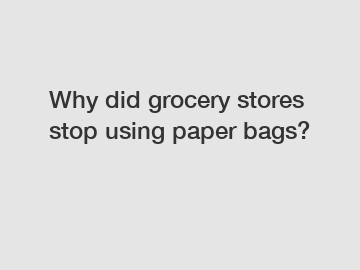Why did grocery stores stop using paper bags?
Why Did Grocery Stores Stop Using Paper Bags?
Over the past few decades, grocery stores have gradually shifted away from using paper bags and have embraced plastic bags as the dominant packaging solution. This change has sparked much debate, with concerns raised about the environmental impact of plastic bags. So, why did grocery stores stop using paper bags? Let's explore the reasons behind this transition, the evidential support for this decision, and the significant implications it holds.
The shift from paper bags to plastic bags can primarily be attributed to cost and convenience factors. Paper bags are relatively more expensive to produce and require more resources such as water and energy during their manufacturing process compared to plastic bags. Additionally, paper bags are also bulkier and heavier, resulting in increased transportation costs for grocery stores. On the other hand, plastic bags are lightweight and easier to handle, allowing for larger quantities to be transported at a lower cost. These economic factors led grocery stores to opt for plastic bags as a more cost-effective and efficient packaging solution.

However, the switch to plastic bags has resulted in severe environmental consequences. Plastic bags are non-biodegradable and can take up to 1000 years to decompose. This inability to break down naturally has led to a massive accumulation of plastic waste in landfills and oceans, causing significant harm to ecosystems and marine life. Furthermore, plastic bags are often improperly disposed of, leading to littering in urban areas and contributing to pollution. These harmful impacts have made addressing the plastic bag problem a pressing environmental concern.
To combat the negative environmental implications, many countries and cities have taken measures to reduce plastic bag usage. Some governments have implemented bans or levies on plastic bags, aiming to encourage their citizens to adopt reusable alternatives such as cloth or jute bags. Such policies not only help in reducing waste but also promote sustainability and raise public awareness about the need to protect the environment.
Moreover, the transition away from paper bags to plastic bags has provoked innovative solutions. The push to find environmentally friendly alternatives to plastic bags has resulted in the creation and popularization of various eco-friendly packaging options. These alternatives range from biodegradable bags made from organic materials to reusable bags made from recycled materials. By embracing these alternatives, grocery stores can reduce their ecological footprint and contribute to building a more sustainable future.
In conclusion, the shift from paper bags to plastic bags in grocery stores originated from cost and convenience considerations. However, the subsequent environmental impact of plastic bags has led to growing concerns and the implementation of measures to reduce their usage. While this transition offers economic benefits, it is vital to find solutions that prioritize sustainability and reduce plastic waste. By understanding the reasons behind this shift and encouraging the adoption of eco-friendly alternatives, we can work towards a greener future.
For more microwave popcorn bags bulk, microwave popcorn packing, popcorn bags for microwaveinformation, please contact us. We will provide professional answers.


